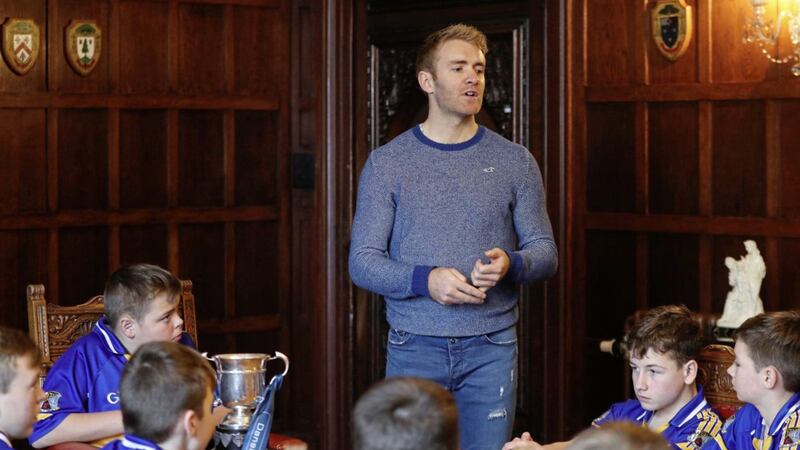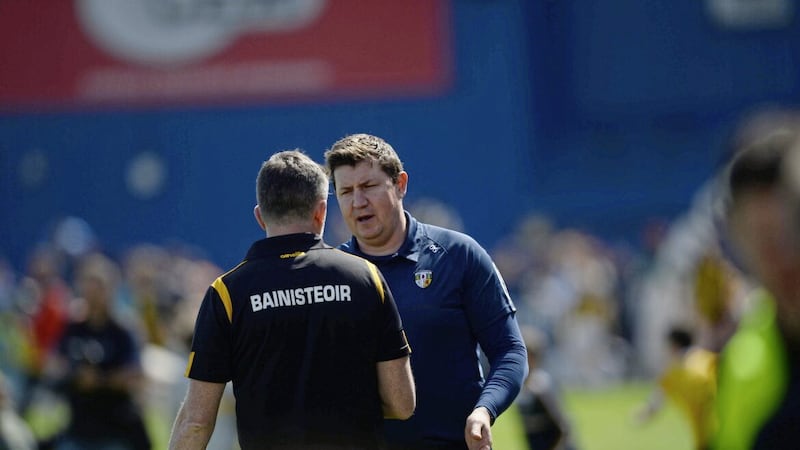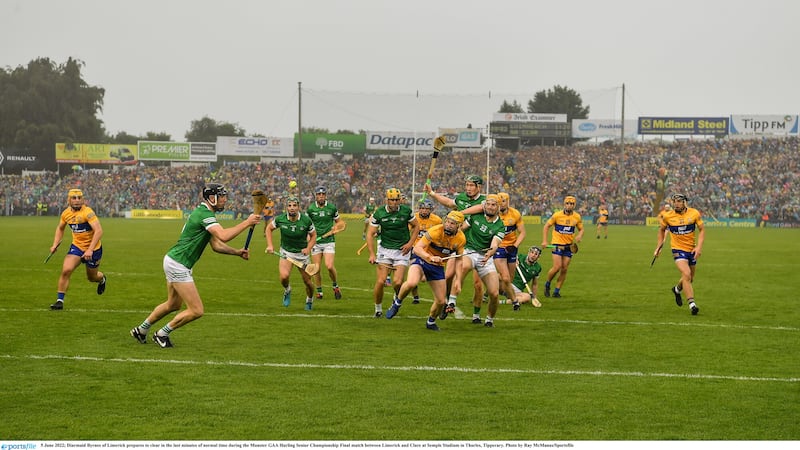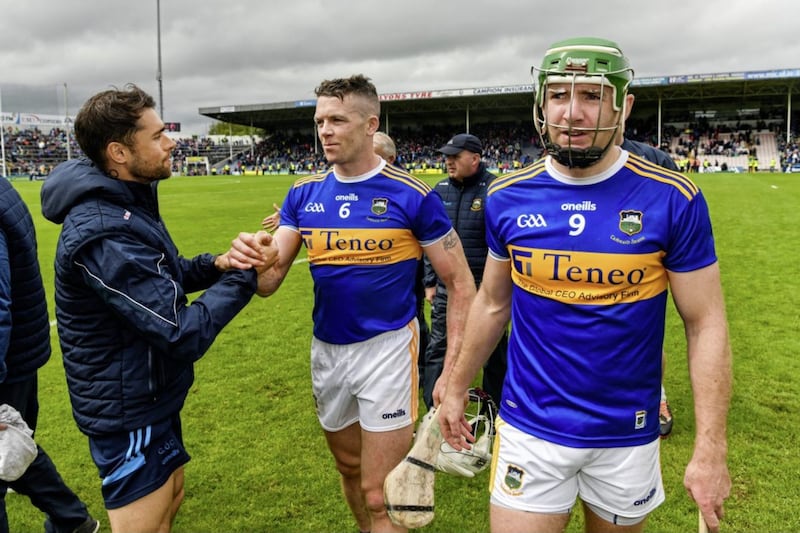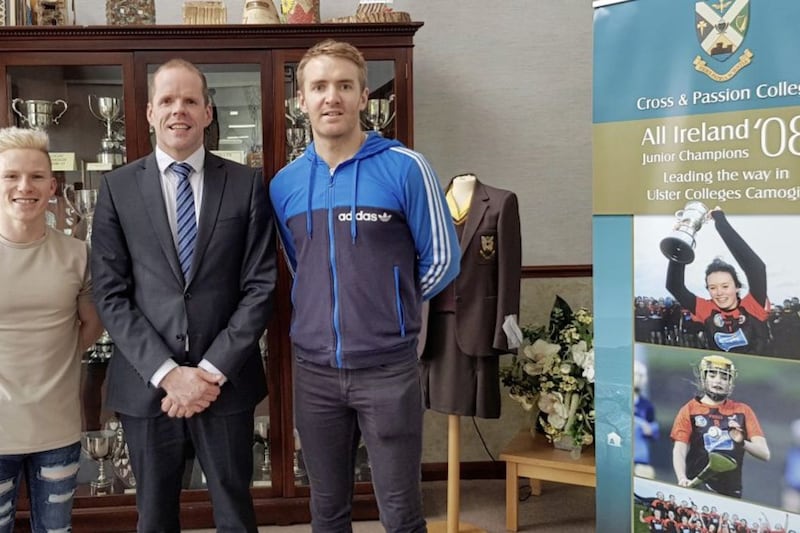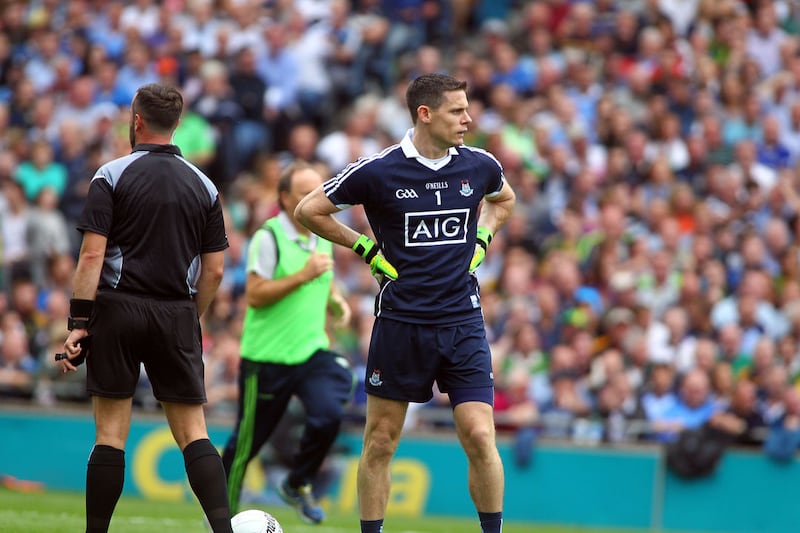SHOULD the GAA go professional?
“There’s nothing more I would love than to be a professional sportsman, but I don’t think it’s possible and I don’t think it would be right. The GAA is too special and should remain as it is.”
Who’s been your toughest opponent?
“Seán Óg Ó hAilpín. He was about 27 or 28 at the time – still in his prime – so he was the toughest I’ve faced.”
Who’s the best player you played with?
“Eoin Kelly. He was probably the best hurler Tipperary ever produced."
---------------------------
The St Killian’s College Garron Tower students take a while before warming to the task of firing questions at Noel McGrath.
The scene is something straight out of Dead Poet’s Society.
McGrath holds court at the top of this beautiful antiquated room – still known in the school as the priests’ dining room from a by-gone era – and the students perch themselves around pristine varnished tables for an intimate Q&A with Tipperary’s double All-Ireland winner.
The innocence and honesty of some of the students’ questions would put seasoned journalists to shame.
McGrath seems to enjoy the early afternoon interrogation and doesn’t duck any of the questions.
Moments earlier, the second year students posed for photographs with the Tipperary hurler on the sprawling lawns outside this former stately home, also accompanied by their recently acquired McNamee Cup.
It’s a cool, clear November afternoon up in the Glens.
From this marvellous height, the Irish Sea is a picture of tranquillity and Scotland’s rough edges are silhouetted in the distance.
You can’t fail to be moved by this panoramic magnificence.
While its visitors are duly mesmerized, you get the impression the 800 or more St Killian’s students are completely oblivious to the surrounding beauty as they learn in Garron Tower’s bosom every week day of their young lives.
McGrath is equally impressed by the scenic route he took this morning from Ballymena to reach Antrim’s coast.
The 26-year-old double Allstar has already delivered his first of two workshops of the day.
The chat with the second year students in the priests’ dining room was merely an extra helping.
For the last 20 months the workshops have been McGrath’s day job, touring the length and breadth of the country talking to students about being the best they can be and dealing with adversity.
Don’t expect hurls or sloithars or pitch drills because there aren’t any.
McGrath’s slickly produced workshop consists of slide shows, short videos, interspersed with him speaking about the challenges of growing up in the modern world and working out how best to fulfil your potential.
The morning workshop, which I attended in the school’s gym, lasted one hour. It flew by.
It was empathetic in tone and inspiring.
One of the many high points of McGrath’s workshop is the short video of Tommy Carroll, a blind skateboarder, and how he has coped – thrived even.
McGrath may only be approaching his 27th birthday later this month - but his is a life lived.
He overcame testicular cancer a couple of years ago and was able to return to top flight hurling within a matter of months of being diagnosed.
He’s won two All-Ireland titles with Tipperary; he’s lost a couple of finals too and is the proud owner of two Allstar gongs (2009 and 2010).
A couple of years ago he opted for a career change.
And, now, here he is sampling the school dinners of St Killian’s College on a bright November day.
“I’d qualified as a secondary school teacher – teaching history and geography – and I’d actually been working in the bank for a while up until the time I got sick,” McGrath explains.
“I went away travelling for a month and I came back and got the opportunity to do workshops in schools, so I took it and I’ve been at it for the last 20 months to two years.”
It’s literally impossible to equate Noel McGrath the hurler in the heat of a Championship battle and the one that’s chatting amiably to over 300 students in the school gym.
“I enjoy doing the workshops,” he says.
“You see students there and you’re just hoping that some will catch onto the talk that you’re giving. It’ll hit home with some of them and maybe help them and inspire them to be the best that they can be and do the best for themselves.”
He adds: “Not all students are interested in hurling or football – and if they’re not interested in sport they can get as much out of the talk, out of the workshop as a student who is really interested in sport.
“You’re trying to help every student no matter what interests they have in whatever they want to do.
“I think the videos are very important because if the talk is lasting for nearly an hour it’s hard for them to keep focus – so the videos I use help the students to interact.
“Everyone likes to see some content and not just people talking down to you. I particularly like the video of the skate-boarder Tommy Carroll. He was blind since he was two years of age and how he has developed his life and done the best that he could do with the situation he was dealt.”
McGrath goes into fearless detail in telling the students how he felt when he was diagnosed with testicular cancer in April 2015.
You could hear a pin drop in the gym.
“I thought: ‘Why did it happen to me? Why did it have to happen at all?’ It was a massive shock to me… In the space of a Monday to Friday after being told I had cancer to getting an operation to remove the tumour, things happened so fast.
“I felt anger, sadness - I never can say I was depressed… But there were days I’d be sitting at home, you’d feel sorry for yourself, and the tears would fall down your face.
“So it wasn’t an easy time for me. But lucky for me I had people around me to help me – my family and friends… I mentioned earlier about some of the stresses and pressure you might be under in school.
“You can ask for help from your teachers, you’ve friends, you’ve parents at home where you can lean on for help.
“There is always somebody there to help you. Without that help, I wouldn’t have got through as successfully as I did, to get back playing sport. If you don’t ask for help, well, it’s hard to find a solution.
“There’s always a way to find a solution.”
It’s fitting that McGrath shows footage of his celebrated return to the Championship stage in the latter stages of Tipperary’s All-Ireland semi-final defeat to Galway in August 2015 at Croke Park.
Away from the spotlight of the school gym, McGrath talks in quiet tones about those few desperate months in 2015.
“I don’t really think having testicular cancer has changed me at all,” he says. “Small things, maybe. I never thought it was going to happen to me. Nobody ever thinks it’s going to happen to them but it did and I just had to deal with it the best way I could.
“I don’t think it has changed me too much as a person. I’d be fairly relaxed about things anyway. I just enjoy what I have now...
“You’d think about it a few times a week at different stages. If something happened it would come back into your mind. I don’t get myself down thinking about it.
“Luckily enough, I’ve been free of it over the last two years and any tests that I’ve done are clear so I’m just getting on with life.
“It’s like anything in life. If something happens you just try to get through them as best you can. I’m just focusing on what I’m doing now – on my sport and on my job – and I’m doing the best that I can with them.”
McGrath was lucky. His cancer was caught early and he only had to undergo one round of chemotherapy after surgery.
“When I found the lump, I didn’t feel sick, I felt fine. I was probably just run down thinking about it in my head and obviously I was the only one that knew about it and I hadn’t shared it with anyone at that stage.
“I only had to do one session of chemotherapy so I probably didn’t feel the full effects of what other people go through.
“It made me tired for maybe two or three days afterwards. It made me think of how tough other people had it and I was that small bit luckier that I didn’t have to go through as much.”
He adds: “It was a whirlwind time; things happened so fast and immediately after when I was given the all-clear my focus was getting back training and playing sport. Maybe in later years when I think back on it a bit more you’ll be able to use the experience.
“Even now, if I can pass the experience on to anyone that’s in a similar situation – if it can help them, that’s one person that might make their life a bit easier or some way better.”
When he was thrust into that 2015 All-Ireland semi-final with number 24 on his back, Croke Park stood to Noel McGrath.
But the Loughmore-Castleiney clubman remembers very little of that day.
“I can’t really remember exactly what was happening or what I was feeling – I just wanted to get out and play. I don’t remember the noise or anything. Maybe it’ll come back to me in time. But it’s something I probably haven’t thought that much about…”
Still licking the wounds of last summer’s All-Ireland semi-final defeat to eventual champions Galway, McGrath hopes Tipp can be in with a shout of the Liam MacCarthy next year.
“Galway are a top class team and we’ve had some great battles with them,” he says. “It’s up to the rest of us to catch up. Everybody will be starting off in January looking to get to the Holy Grail in Croke Park.”
After answering a thousand questions from this journalist and the college’s McNamee winners, his afternoon workshop is already upon him.
Three-hundred more students, sitting in neat rows, await McGrath in the school gym.
Ready to listen and prepared to be inspired by the quietly spoken Tipperary man.
ST Killian’s College currently run a resilience programme which assesses students’ resilience and mental toughness.
Under the programme teachers are trained to use a Mental Toughness Tool Kit (an online questionnaire) to allow them to identify strengths and area for development for students to work on.
This is reviewed at the beginning and at the end of the programme to judge how far the students’ resilience has improved.
The aim of the programme is to prepare the students for life in general and to raise their resilience.
The shared education partnership of St Killian’s, Larne Grammar, Larne High and Roddensnvale school are the only schools delivering the programme in Northern Ireland to students and it is hoped that there will be a positive impact, not only on their mental health but in the attainment of students across the board.
The involvement of Noel McGrath is an additional aspect to developing our young people into rounded well balanced people who can meet success and adversity in equal terms.
(Johnny Brady School Principal).
